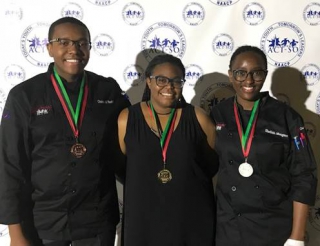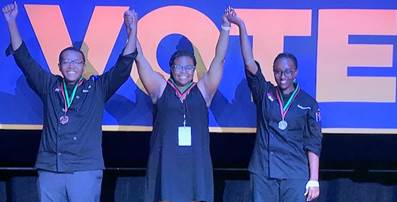
Culinary Competition Awards Life-changing Scholarships to Underserved Youth
27 February 2019The culinary arts discipline of the NAACP’s Afro-Academic, Cultural, Technological and Scientific Olympics provides an opportunity for students to pursue dreams of becoming a professional chef.
By Thomas Smith
 For today’s inner-city youth, dreams of becoming a professional chef are not as out of reach as they may seem. The NAACP’s Afro-Academic, Cultural, Technological and Scientific Olympics (ACT-SO) achievement program helps culinary and hospitality students of color by awarding scholarships and educational credit. Preparations for ACT-SO’s culinary arts competition are especially rigorous, but its scholarship grand prize of $30 thousand per year to attend the Culinary Institute of America (CIA) is well worth the effort.
For today’s inner-city youth, dreams of becoming a professional chef are not as out of reach as they may seem. The NAACP’s Afro-Academic, Cultural, Technological and Scientific Olympics (ACT-SO) achievement program helps culinary and hospitality students of color by awarding scholarships and educational credit. Preparations for ACT-SO’s culinary arts competition are especially rigorous, but its scholarship grand prize of $30 thousand per year to attend the Culinary Institute of America (CIA) is well worth the effort.
The culinary arts competition was added in 2015, although ACT-SO has been helping high-school students for over 40 years. Over 1,100 students from 200 communities have participated across ACT-SO’s 32 disciplines. Since being established, ACT-SO’s culinary and hospitality programs have awarded over $275 thousand to well-deserving youth. Chef Sterling Smith, a culinary advisor working in liaison with ACT-SO, helped establish the competition and refers to his line of work as a labor of love.
“I wish I could have gone straight into the CIA,” he said. “Even though I am a CIA grad, I went after I came out of the military. I wish I had that opportunity.”
The head chef’s role has changed from working with students hands-on to judging and presiding over the competition. He said he recommends getting involved with ACT-SO to his colleagues as often as possible and truly believes the program changes lives.
Over 50 underserved youth in Atlanta; Chicago; Detroit; Houston; Washington D.C.; Albuquerque, N.M.; Bloomington, Ill; Charlestown, S.C.; Flint, Mich.; Kansas City, Miss.; Raleigh, N.C; and Prince George’s county, Md. participate in ACT-SO’s culinary program every year. Smith said the program is targeted toward regions where opportunities are especially scarce.
“Some of these kids have not even gone downtown,” said program manager Lourdes Diaz. “They sort of live in their neighborhoods, and they’ve never gone to a nice restaurant - and we take them to nice restaurants.”
Culinary competitors are required to have single-minded dedication to the program because of its time intensity, while other ACT-SO disciplines allow students to pursue up to three academic interest areas. Smith said preparation for the competition is a long process, spanning from February to July.
As part of this process, Smith works with teachers to pair students with a mentor. The chef said all mentors are highly qualified chefs who help mentees with much-needed presentation and culinary skills throughout the year. Pairs are together for the entire process and have been known to work together after the student graduates from the CIA.
“A lot of the kids open up to the chefs and feel so comfortable with them that they end up developing a bond or friendship,” Diaz said.
Culinarians must score at least 95 out of 100 possible points and win their local qualifier to advance to the national ACT-SO competition. Smith said the culinary arts competition has 15 categories, some of which are weighted more heavily than others. Food safety and taste are the most important categories, but students must also be conscious of their time management, presentation, attire, decorum, and even waste usage.
Diaz described the preparations as particularly demanding. “This is how serious this is: it’s not about giving the child an opportunity to compete,” she said. “It’s about earning that seat at a national competition which could give students a $30 thousand scholarship.”
Competing students are judged according to the American Culinary Foundation’s criteria for high school competitions, Smith said. This includes a pantry list that denotes which food items can be used to create a two-course meal. The pantry list is reasonably extensive, containing over 70 food items. However, competitors are restricted to one of two sources of protein, either chicken or duck.
The ACT-SO competition itself takes place over one weekend, spanning Thursday to Sunday. Thursday night competitors attend a reception. On Friday the young culinarians participate in dry runs. On Saturday, the long-awaited competition takes place, which is set up like a professional arena-style culinary contest. He said competing is an adrenaline rush for students and mentors alike. Sunday, the final day, is reserved for the ceremony, in which scholarships are awarded to ACT-SO winners. The 2019 competition will be held in Detroit.
ACT-SO also offers a hospitality competition with a $15 thousand scholarship grand prize for students who are interested in culinary management. Smith said the hospitality program is a subsection of ACT-SO’s business competition, in which competitors work in teams of three (plus one alternate who will likely not compete). Students must present a comprehensive business model, including health permits, menu composition, budget, and a business plan they could take to a bank for financing. They must also have one-year and five-year business plans supported by real numbers.
“On the hospitality side we still have a culinary factor,” Smith said, “but they basically need the back-office skills and the development skills.”
Many ACT-SO participants have become famous and successful, including Kevin Hart, Jaden Smith and Jenifer Lopez. The head chef said these celebrities like to stay involved with ACT-SO, sometimes hosting competitions or ceremonies.
Smith said, “ACT-SO enables students to be able to compete, not only for a prize but to compete for something better than a prize: to be able to grow their education.”
ACT-SO’s culinary competition is sponsored by Sodexo, a company instrumental in establishing the culinary discipline, as well as providing mentorship and continued support. The achievement program also partners with Hilton and Hyatt, which often supply practice spaces and materials. Diaz said these companies also hire ACT-SO competitors after they have graduated.
“For them to compete for a scholarship and go to school for what they’ve been dreaming about, which is to become a chef, changes everything,” Diaz said. “These students were thinking they were just going to graduate from high school and get a job, because (most students are) coming from a single-family home with other siblings, and they’re the oldest and they need to pay the bills. We’ve heard this story after story after story. We’ve touched the lives of a significant number of students that are now excelling. It’s a great (new) story.”
